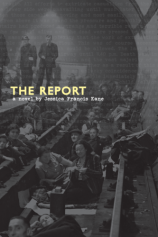The Report
Review
The Report
Whether it's a terrorist attack or a massive oil spill, the ritual that follows a catastrophe has become numbingly familiar: appointed with great fanfare, a special commission subpoenas mountains of documents and convenes hearings in the glare of television lights to cross-examine miscreants and bureaucrats and listen to the heartrending stories of victims. It was not always thus, as Jessica Francis Kane makes clear in this thoughtful novel exploring the aftermath of a real-life tragedy in World War II London.
On March 3, 1943, at the entrance to the unfinished Bethnal Green Tube station in the city's East End, 173 people died in an inexplicable stampede to enter the underground shelter where up to 6,000 residents sought protection nightly from German bombing raids. When a cursory police investigation of the incident prompts public outrage, the home secretary appoints Laurence Dunne, a respected magistrate, to conduct a more searching probe. "Death demands ceremony," Dunne reflects on his role. "An inquiry is just a kind of ceremony."
"THE REPORT explores with impressive subtlety and keen intelligence the task facing a man of integrity in trying to reconstruct, and ultimately understand, an inexplicable tragedy."
A disciplined, patient man with a passion for fly fishing and Bach, Dunne methodically sets about his task. Working alone, in less than three weeks he interviews 80 witnesses and produces his report. For the inquisitorial environment of the hearing room, he substitutes a carefully designed setting intended to draw witnesses out, even offering them a cup of tea to calm their frayed nerves. But Dunne soon finds that whether motivated by the instinct for self-protection or the inevitable curse of faulty memory, the witness accounts are incomplete and contradictory, leaving him the nearly impossible task of assembling a coherent narrative.
There is no shortage of potential villains: Shelter warden James Low is tortured by his well-intentioned decision to replace a 25-watt bulb at the entrance on the evening of the incident after the light is later smashed by someone evidently fearing that its illumination will make the station a target for German bombs. A local constable is tardy arriving when a timely appearance might have helped prevent the stampede. The government itself may be partially to blame, with reports of an explosion and suspicion that testing of a new anti-aircraft weapon may have prompted the panic. And most dramatically, Dunne suspects that a neighborhood woman who loses her young daughter in the crush of bodies has triggered the panic by pushing a "refugee" (a code name for Eastern European Jews) woman. The surpassing irony is that on the night of the Bethnal Green disaster, no bombs fell on the city of London.
Dunne adopts as his touchstone the philosophy of the local parish priest, who reminds him, "I always wanted to believe people weren't as bad as the worst thing they do." Determined that "the story should add up to more than the facts," he brings to bear a "mixture of empathy and insight" to the task of sifting through the witnesses' fragmentary recollections of the disaster to produce a report that will explain without condemning.
In this, her first novel, Kane seems comfortable with a similar approach. She's generous to all her characters in sparing them the weight of full judgment, understanding, as Dunne does, that the worst crime most committed that terrible night was simply being human and that no faultfinding could equal each survivor's burden of self-imposed guilt.
Kane also employs an intriguing device to frame the historical portion of the novel. As the 30th anniversary of the tragedy nears, a young documentary filmmaker named Paul Barber approaches Dunne for an interview. In a series of conversations conducted mostly in the quiet home of the now-widowed magistrate, Barber gently probes Dunne's memory and motivation as the older man discovers his questioner's personal connection to the tragedy.
Laurence Dunne, a good and decent public servant, accepts the role he's been asked to play in serving our inescapable propensity to seek explanations and, ultimately, to assign blame. But as portrayed by Kane, he's wise enough to recognize the limits to that process. "People think they want the whole truth," one character concludes after the report is suppressed by the same government official who appointed Dunne, "but they're far happier with only as much as they can forgive."
THE REPORT explores with impressive subtlety and keen intelligence the task facing a man of integrity in trying to reconstruct, and ultimately understand, an inexplicable tragedy. In fact, as Jessica Francis Kane suggests in this strikingly honest yet compassionate story, wise people know there rarely are any simple answers to these painful questions, and the search for them, more often than not, is a fool's errand.
Reviewed by Harvey Freedenberg on October 22, 2010
The Report
- Publication Date: August 31, 2010
- Genres: Fiction, Historical Fiction
- Paperback: 240 pages
- Publisher: Graywolf Press
- ISBN-10: 1555975658
- ISBN-13: 9781555975654




